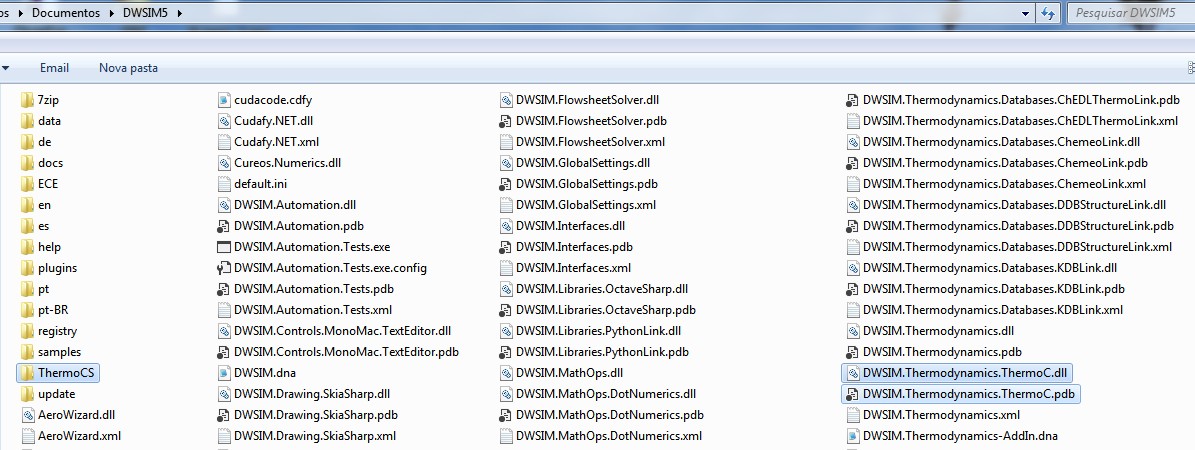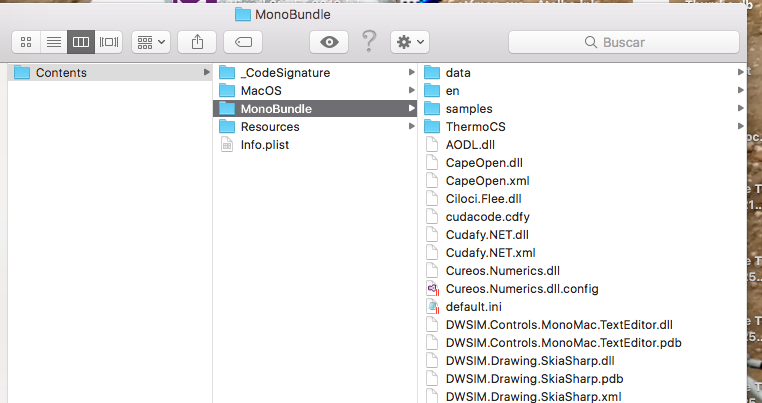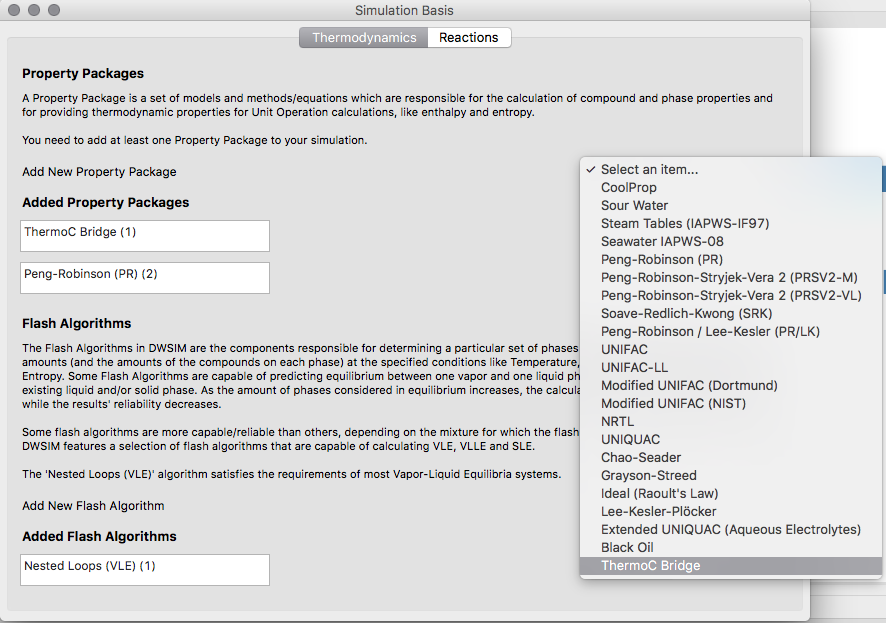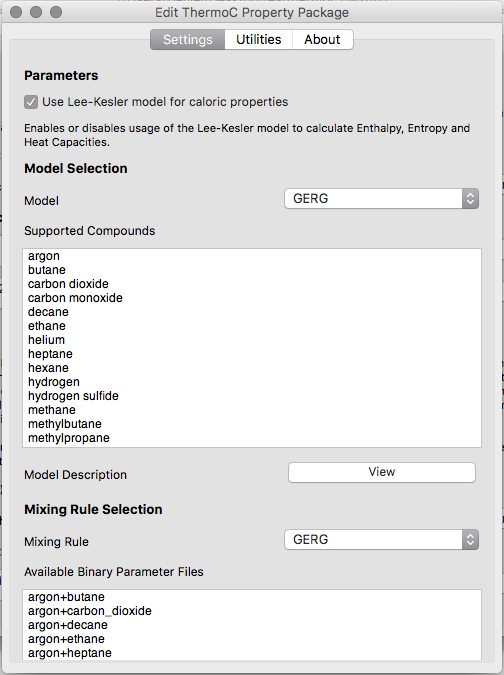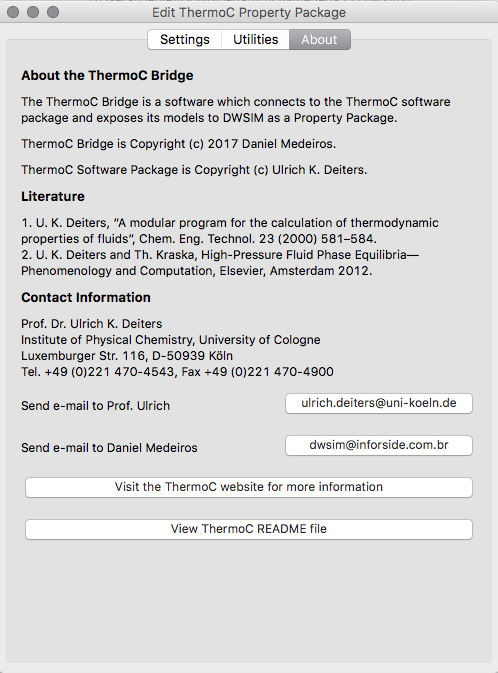Difference between revisions of "ThermoC Bridge Library"
(Created page with "<h2><span class="mw-headline" id="Introduction">Introduction</span></h2> <p>The ThermoC Bridge is a library which connects the [http://thermoc.uni-koeln.de/index2.html <b>Ther...") |
m |
||
| (One intermediate revision by the same user not shown) | |||
| Line 419: | Line 419: | ||
</p> | </p> | ||
<h2><span class="mw-headline" id="Download">Download</span></h2> | <h2><span class="mw-headline" id="Download">Download</span></h2> | ||
| − | <ul><li> ZIP Package for Windows: [https://gum.co/xsNTL version 1. | + | <ul><li> ZIP Package for Windows: [https://gum.co/xsNTL version 1.4.0 (ThermoC version 4.0)]</li> |
| − | <li> ZIP Package for macOS: [https://gum.co/LvBGP version 1. | + | <li> ZIP Package for macOS: [https://gum.co/LvBGP version 1.4.0 (ThermoC version 4.0)]</li> |
<li> Debian Installer Package for Linux: [https://gum.co/kccyJ version 1.3.2 (ThermoC version 4.0)]</li> | <li> Debian Installer Package for Linux: [https://gum.co/kccyJ version 1.3.2 (ThermoC version 4.0)]</li> | ||
<li> Debian Installer Package for Raspberry Pi: [https://gum.co/UEPmU version 1.3.2 (ThermoC version 4.0)]</li></ul> | <li> Debian Installer Package for Raspberry Pi: [https://gum.co/UEPmU version 1.3.2 (ThermoC version 4.0)]</li></ul> | ||
<h2><span class="mw-headline" id="Installation">Installation</span></h2> | <h2><span class="mw-headline" id="Installation">Installation</span></h2> | ||
| − | <p>This library requires <b>DWSIM 5. | + | <p>This library requires <b>DWSIM 5.8 or newer</b> in order to work correctly. The installation procedure depends on which package you've downloaded: |
</p> | </p> | ||
<h3><span class="mw-headline" id="ZIP_Package_for_Windows">ZIP Package for Windows</span></h3> | <h3><span class="mw-headline" id="ZIP_Package_for_Windows">ZIP Package for Windows</span></h3> | ||
| Line 432: | Line 432: | ||
</p> | </p> | ||
<h3><span class="mw-headline" id="ZIP_Package_for_macOS">ZIP Package for macOS</span></h3> | <h3><span class="mw-headline" id="ZIP_Package_for_macOS">ZIP Package for macOS</span></h3> | ||
| − | <p>[https://apple.stackexchange.com/questions/62410/how-can-i-open-a-folder-called-something-app-in-various-applications Open the DWSIM.app App Bundle as a directory] and unpack the contents of the ZIP file into | + | <p>[https://apple.stackexchange.com/questions/62410/how-can-i-open-a-folder-called-something-app-in-various-applications Open the DWSIM.app App Bundle as a directory] and unpack the contents of the ZIP file into 'DWSIM.app/Contents/MonoBundle' folder, keeping the directory structure of the files inside the ZIP package intact. |
</p><p>[[File:Thermoc_2.png]] | </p><p>[[File:Thermoc_2.png]] | ||
</p> | </p> | ||
| Line 453: | Line 453: | ||
Luxemburger Str. 116, D-50939 Köln | Luxemburger Str. 116, D-50939 Köln | ||
</p><p>Tel. +49 (0)221 470-4543, Fax +49 (0)221 470-4900 | </p><p>Tel. +49 (0)221 470-4543, Fax +49 (0)221 470-4900 | ||
| − | Email: [mailto:ulrich.deiters@uni-koeln.de | + | Email: [mailto:ulrich.deiters@uni-koeln.de [1]] |
</p> | </p> | ||
<h3><span class="mw-headline" id="ThermoC_Bridge">ThermoC Bridge</span></h3> | <h3><span class="mw-headline" id="ThermoC_Bridge">ThermoC Bridge</span></h3> | ||
Latest revision as of 19:15, 24 June 2020
Contents
Introduction
The ThermoC Bridge is a library which connects the ThermoC Software to DWSIM and expose some of its calculation methods to DWSIM as a Property Package.
ThermoC is a modular program package for calculating thermodynamic data (pVT data, caloric data, phase equilibria) of pure fluids and fluid mixtures from equations of state. The main ThermoC features are:
- Handles any reasonable equation of state - cubic, non-cubic semiempirical, or multi-parameter reference equations
- Handles any reasonable mixing rule or mixing theory - 1-fluid theory, mean-density approximation, density-dependent 1-fluid theory...
- Calculates a wide range of thermodynamic properties
Implemented Equations of State
<tbody></tbody>| Name | Description |
|---|---|
| BACK | Boublík–Alder–Chen–Kreglewski |
| BNJS-2LJ | mod. Boublík–Nezbeda repulsion + Jacobsen–Stewart attraction: 2-center Lennard-Jones 12/6 fluid |
| CS | Carnahan–Starling repulsion term only |
| CSD | Carnahan–Starling repulsion * Dieterici attraction |
| CSJS-LJ | mod. Carnahan–Starling repulsion + Jacobsen–Stewart attraction: Lennard-Jones 12/6 fluid |
| CSRK | Carnahan–Starling repulsion + Redlich–Kwong attraction |
| CSvdW | Carnahan–Starling repulsion + van der Waals attraction |
| D1 | Deiters |
| D1A | Deiters + chain association |
| EW | Erpenbeck–Wood hard-sphere reference |
| GEOS | Generalized cubic EOS |
| GERG | GERG-2008 natural gas reference |
| IAPWS | IAPWS water reference |
| IUPAC-N2 | IUPAC nitrogen reference |
| IUPAC-O2 | IUPAC oxygen reference |
| JS | Jacobsen–Stewart/Bender/Schmidt–Wagner reference |
| KN-LJ | Kolafa–Nezbeda: Lennard-Jones 12/6 fluid |
| LJ | Lemmon–Jacobsen reference |
| mBWR1-LJ | modified Benedict–Webb–Rubin: Lennard-Jones 12/6 fluid (EOS of Nicolas et al.) |
| mBWR2-nLJ | modified Benedict–Webb–Rubin: Lennard-Jones 12/6 fluid (EOS of Johnson et al., with an extension to handle flexible tangent-sphere chain molecules) |
| Mxw2RK | soft sphere repulsion + Redlich–Kwong attraction |
| Mxw2vdW | soft sphere repulsion + van der Waals attraction |
| Mxw2vdWA | soft sphere repulsion + vdW + chain association |
| PCSAFT | perturbed chain statistical associating fluid theory |
| PR, PR78 | Peng–Robinson |
| PT1, PT2 | Patel–Teja |
| QC-LJ | Quiñones-Cisneros: Lennard-Jones 12/6 fluid |
| QC1 | Quiñones-Cisneros |
| RK | Redlich–Kwong (original T-dependence) |
| RKHJ | Redlich–Kwong–Heidaryan–Jarrahian |
| RKS | Redlich–Kwong–Soave |
| SL | Sanchez–Lacombe |
| SPHCT | simplified perturbed hard chain |
| sSPHCT | soft-core simplified perturbed hard chain |
| TBS | Trebble–Bishnoi–Salim, with generalized or optimized coefficients |
| vdW | van der Waals |
| vtPR | volume-translated Peng–Robinson |
| vtPR-xhc | volume-translated Peng–Robinson for hydrocarbons at high pressures and temperatures |
| WS | Wagner–Setzmann reference |
| WS-CO2 | Wagner–Span carbon dioxide reference |
| WSsh | Span–Wagner short: non- and weakly polar fluids: |
| XD | Xiang–Deiters generalized corresponding states theory: |
| YKchvdW | Yelash–Kraska chain, quartic repulsion + vdW attraction |
Original Main Programs
The original main programs can be accessed from the ThermoC Property Package Configuration Window:
<tbody></tbody>| Name | Description |
|---|---|
| charact1 | Brown's characteristic curves (Joule inversion, Boyle, Joule-Thomson inversion curves) |
| check1 | consistency test for user-supplied EOS modules |
| checkN | consistency test for mixture modules |
| crit2 | critical curves of binary mixtures |
| difflimit1 | binary diffusion coefficient at zero concentration |
| expandN | adiabatic expansion curves |
| ffe1 | vapour pressure curve of a pure fluid |
| ffe2 | VLE, LLE for binary mixtures (obsolete) |
| ffeN | VLE, LLE for multi-component mixtures |
| mixN | temperature and volume change upon isenthalpic-isobaric or isenthalpic-isentropic mixing of pure fluids |
| phase2 | VLE, LLE, SLE, SGE of binary mixtures (combines ffe2 and sfe2, but uses another search algorithm) |
| reduc1 | calculation of pure-fluid EOS parameters from exp. data |
| reduc2 | EOS cross parameter estimation for binary mixtures |
| reduc21 | EOS pure-fluid parameter estimation from mixture data |
| rsfe1 | dehydration of a solid compound (and analogous reactions) |
| sfe1 | sublimation pressure curve of a pure fluid |
| sfe2 | SLE, SGE for binary mixtures |
| sle1 | melting pressure curve of a pure compound |
| spinodal1 | spinodal curve of a pure compound |
| spinodal2 | spinodal curves of binary mixtures |
| surf1 | surface tension (from viscosity) |
| transit2 | solid/fluid flash of binary mixture; transitiometer simulation |
| virN | virial coefficients of pure fluids or mixtures |
| visco1 | viscosity of pure fluids (friction theory) |
| viscofit1 | fitting of friction theory parameters |
| xthN | single phase properties of fluids (including excess properties) |
| xth1s | thermodynamic properties of a single solid phase |
| xth2s | single phase properties of impure solids |
Calculated Properties (DWSIM)
These are the single-fluid and mixture properties calculated by the ThermoC library and exposed to DWSIM through the Property Package:
- Enthalpy
- Entropy
- Heat Capacity (Cp and Cv)
- Density
- Compressibility Factor
- Compound Fugacities
Calculated Properties (original main programs)
These properties can be obtained by running the main programs:
Pure fluids
- sublimation pressure curve
- melting pressure curve
- vapour pressure curve
- spinodal curve
- virial coefficients
- single-phase properties (for given pressure or molar volume): internal energy, enthalpy, entropy, compressibility, heat capacity, speed of sound, compression factor, …
- single-phase compression/expansion (isothermal, isenthalpic, adiabatic)
- adiabatic two-phase compression/expansion
- viscosity (from friction theory)
- surface tension (from friction theory or gradient theory)
- parameter fitting
Mixtures
- fluid–fluid phase equilibria (vapour–liquid, liquid–liquid, gas–gas)
- solid–fluid phase equilibria (e.g., solid + supercritical fluid)
- isobaric-isenthalpic mixing and isobaric-isentropic mixing
- critical curves (all critical curves of a mixture in a single sweep)
- spinodal curves
- single-phase properties (for given pressure or molar volume): same as for pure fluids; in addition: excess properties
- transitiometer/DSC simulation (calculates heat during a temperature or pressure scan of a mixture with a fixed overall composition)
- single-phase compression/expansion (isothermal isenthalpic, adiabatic)
- two-phase adiabatic compression/expansion
- limiting diffusion coefficients of solutes in fluids (from friction theory)
- surface tension (from gradient theory)
- decomposition pressure of solids (hydrates, carbonates, …)
- parameter fitting
Warning/Disclaimer
The data and information within the ThermoC Bridge Software has been obtained from a wide variety of literature sources. While reasonable care has been exercised in the collection of data and testing of this software, the author and contributors of the software disclaims any warranty, expressed or implied, as to the accuracy or reliability of the data or calculations contained therein. The results of calculations obtained from the software yield approximate results, which will not always be suitable for every application. The software is designed for use by trained professional personnel and is not a substitute for sound professional judgment. It is the sole responsibility of the user to validate the data presented by the software and to determine whether the results of this program are accurate and suitable for any specific purpose. No guarantee of accuracy or fitness for any purpose is expressed or implied. The author and contributors strongly recommends that the data be checked against other sources and/or methods before use and application. The author and its contributors shall not be held liable for any direct, indirect, consequential or incidental damages incurred through use of the data or calculations.
Download
- ZIP Package for Windows: version 1.4.0 (ThermoC version 4.0)
- ZIP Package for macOS: version 1.4.0 (ThermoC version 4.0)
- Debian Installer Package for Linux: version 1.3.2 (ThermoC version 4.0)
- Debian Installer Package for Raspberry Pi: version 1.3.2 (ThermoC version 4.0)
Installation
This library requires DWSIM 5.8 or newer in order to work correctly. The installation procedure depends on which package you've downloaded:
ZIP Package for Windows
Unpack the contents of the ZIP file into DWSIM's current installation directory, keeping the directory structure of the files inside the ZIP package intact.
If you get the "An attempt was made to load an assembly from a network location which would have caused the assembly to be sandboxed in previous versions of the .NET Framework" error message, unblock the downloaded ZIP file (right-mouse button click > 'Properties') and extract it again to DWSIM's folder.
ZIP Package for macOS
Open the DWSIM.app App Bundle as a directory and unpack the contents of the ZIP file into 'DWSIM.app/Contents/MonoBundle' folder, keeping the directory structure of the files inside the ZIP package intact.
Debian Installer Package
Install the package as usual. Make sure that DWSIM is already up-to-date before installing the package.
Usage
Create a new simulation or open the Simulation Settings window. You should see a new ThermoC Bridge item on the Property Package listing. Add one instance of it to your simulation.
Click on "Edit" to setup the EOS Model and Mixing Rule.
Each model supports different compounds and mixing rules. If you've added a compound which is not supported by the currently selected model, you'll get an error during the calculation of the flowsheet.
If ThermoC doesn't have a binary interaction parameter file for one or more binary pair of compounds with the currently selected mixing rule, the calculation still can be done normally, though it is advisable to use one of the supplied utilities to fit experimental data and create the missing file.
Contact / Support Information
ThermoC Software
For questions about the implemented models in the ThermoC software, please contact Prof. Ulrich Deiters:
Prof. Dr. Ulrich K. Deiters
Institute of Physical Chemistry, University of Cologne Luxemburger Str. 116, D-50939 Köln
Tel. +49 (0)221 470-4543, Fax +49 (0)221 470-4900
Email: [1]
ThermoC Bridge
For the specific DWSIM functionality, use the DWSIM Support Forums: [2]
